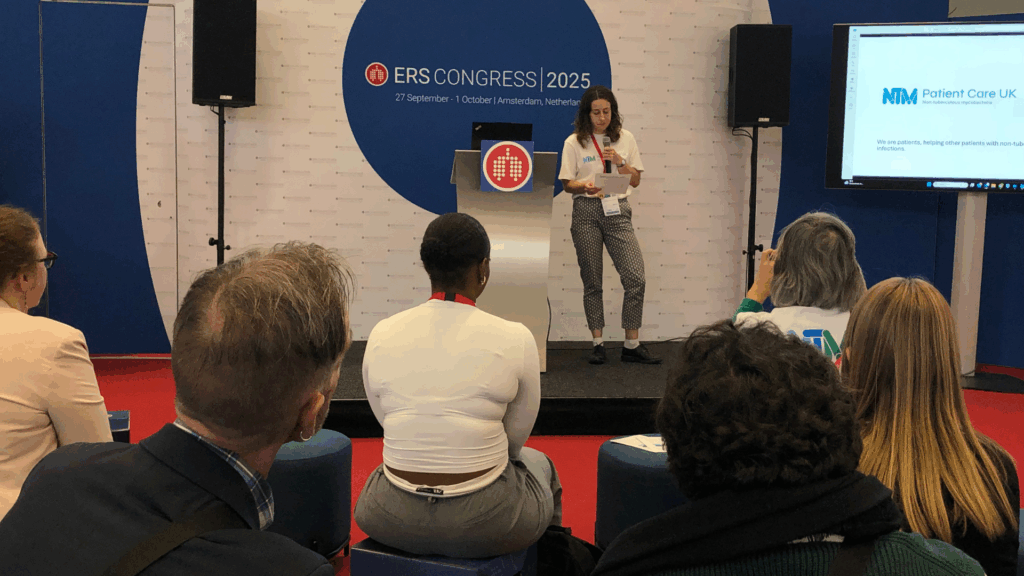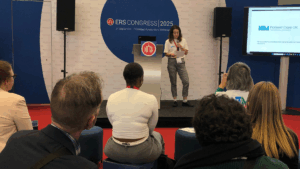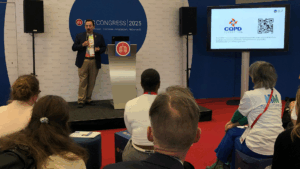
At this year’s ERS Congress, the ELF team hosted sessions in the World Village. “Patient organisations at work across the globe” highlighted the diversity, dedication and impact of organisations in the ELF Patient Organisation Network, with groups from Europe, Asia, North America and Australia sharing projects, advocacy efforts and opportunities for collaboration.
Several organisations used the sessions to introduce themselves to the ELF network and ERS Congress delegates, highlighting their missions and enthusiasm for international collaboration.

The Pink Tree Foundation (India) promotes healthy lungs and supports people living with asthma, COPD, obstructive sleep apnoea and pulmonary tuberculosis. The organisation plans to expand into interstitial lung diseases and fibrosis, inviting partnerships with other organisations worldwide.
Tiny Sparks WA (Australia) supports children with rare lung conditions through awareness, education and parent support. Joining the ELF network offers opportunities to connect internationally and share best practices for improving quality of life.
NTM Patient Care UK provides guidance, education and peer support for people living with non-tuberculous mycobacterial lung disease. The organisation emphasised the value of collaboration with international partners to improve treatment access and patient outcomes.
Stichting PIBO (Netherlands) supports children with Post-Infectious Bronchiolitis Obliterans, providing information, connecting families and physicians and funding research to improve diagnosis and care. The organisation emphasised the value of the ELF Patient Organisation Network, and the importance of working together to better respiratory healthcare across the globe.
Asthma and Allergy Spain called for prevention, equitable access, innovation and patient involvement through their manifesto “When the air changes”. The initiative aims to build a collaborative network to ensure breathing well is a universal right.
Established organisations shared their ongoing advocacy and awareness initiatives.

FFAAIR (France) highlighted education, advocacy and awareness projects for people living with chronic respiratory diseases, encouraging clear communication and European collaboration.
Asthma + Lung UK showcased digital self-management tools, emphasising patient-centred design, real-world usage and long-term testing. The organisation urged funders and researchers to prioritise patient engagement alongside clinical outcomes.
EFA discussed COPD-focused advocacy and awareness campaigns across Europe, strengthening patient voices in healthcare decisions and supporting international collaboration.
The COPD Foundation (US) shared initiatives in COPD, bronchiectasis and NTM lung disease, highlighting World Oxygen Day in October as a key opportunity for global collaboration.
Some organisations focused on rare lung diseases and cross-border networks to improve care.

Associazione Apnoici Italiani (AAI) advocates for patients with sleep apnoea and related disorders, promoting early diagnosis, European awareness campaigns and safe device monitoring.
ERN-LUNG highlighted the European Reference Network for rare lung diseases. Emphasising “Knowledge travels, not the patients!”, they introduced the ERN-LUNG Patient Board and the Breathe registry, a patient registry collecting data across Europe to support research and improve care.
PHA Europe described their work guided by four pillars: awareness, capacity building, advocacy and information. Their mission is to empower people with pulmonary hypertension and ensure patients’ voices are heard internationally.
Alpha-1 Foundation (US) shared advocacy, awareness and patient support for alpha-1 antitrypsin deficiency, collaborating closely with European partners to ensure timely diagnosis and care.
Across two sessions, the ERS Congress highlighted the passion, innovation and dedication of the global lung patient community. From introducing new organisations to sharing European collaborations and advocacy campaigns, the sessions showcased how knowledge, experience and partnerships are improving care, raising awareness and amplifying patients’ voices worldwide. ELF continues to foster these connections, helping patient networks share expertise and support one another across borders.